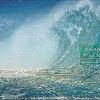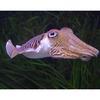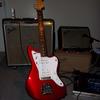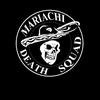IMNoone

Joined: May 18, 2013
Posts: 41
|

Posted on Dec 19 2014 04:02 PM
So I've been playing and making guitar noise since 1980, but always as a rhythm player (with some singing). I've played almost no solos EVER and any 'lead' parts had to be heavily tabbed and rehearsed because sadly, I don't know even one scale. I'll have a little time over the holidays and I wondered if you fine folks could suggest some scales that would help me play traditional-type surf music.
Many THX!
|
Badger

Joined: Nov 16, 2013
Posts: 4537
Wisconsin







|

Posted on Dec 19 2014 04:26 PM
Using the search function and "scales for surf" immediately produced a bunch of results. Here's one.
— Wes
SoCal ex-pat with a snow shovel
DISCLAIMER: The above is opinion/suggestion only & should not be used for mission planning/navigation, tweaking of instruments, beverage selection, or wardrobe choices.
|
IMNoone

Joined: May 18, 2013
Posts: 41
|

Posted on Dec 19 2014 04:36 PM
Thanks Badger, I'd just written 'scales' and didn't see much.
|
Tuck

Joined: Sep 02, 2006
Posts: 3166
Denver, CO







|

Posted on Dec 19 2014 04:50 PM
I speak largely from ignorance, but, honestly, I don't think it's about scales on neck or paper, though practicing those on the neck improves dexterity and helps with improvisation or with your instincts about where to reach most easily for the next note. Really, though, it's about playing the right notes and the finger tactics of moving between them. They come from a scale or possibly several, of course. But I think they get onto the neck from either feeling them or reading them. It's the rhythm guitarist that has to know the scale or key, since it determines the chords. I think the main problem people report with learning leads is that they may be played functionally in one key's fingerings, but tuning up or down or drop tuning the lower E string or speeding up or down the playback may make the original "tactics" harder to deduce.
Of course, the notes are just the foundation. Voicing or articulating them so they sound right is more.
|
zzero

Joined: Jul 09, 2010
Posts: 1153
Lillian Alabama


|

Posted on Dec 19 2014 06:44 PM
A catfish is a fish with no scales. Just saying'
Merry Christmas!! 
— Enjoying the surf,sun and sand!!
|
el_camello

Joined: Jul 04, 2010
Posts: 369
Ottawa


|

Posted on Dec 26 2014 09:55 PM
Your years of rhythm guitar playing might be really useful, many surf melodies closely follow the chords of the song. Maybe start with arpeggios and move onto pentatonics and major/minor scales.
— -Pierre
The Obsidians! (Ottawa surf)
The Obsidians debut EP
|
DannySnyder

Joined: Mar 02, 2006
Posts: 11076
Berkeley, CA











|

Posted on Dec 26 2014 11:09 PM
I would try learning a lead to a song, skipping the scales. I for one have never studied scales on the guitar ( a little on piano). The key to playing a lead is to know it in your head before you can know it with your fingers. If you have a private place ( a car is perfect) practice singing or humming along with the song you choose, until you really have it internalized. Then, start to feel it out on the guitar. Definitely make use of slow-down software to get yourself started. If you're advanced enough on the computer, figure out how to loop sections so you can practice on part at a time.
You can do it, just set modest goals and enjoy the process.
— Danny Snyder
"With great reverb comes great responsibility" - Uncle Leo
I am now playing trumpet with Prince Buster tribute band 'Balzac'
Playing keys and guitar with Combo Tezeta
Formerly a guitarist in The TomorrowMen and Meshugga Beach Party
Latest surf project - Now That's What I Call SURF
|
IMNoone

Joined: May 18, 2013
Posts: 41
|

Posted on Dec 27 2014 12:08 PM
Thanks guys, good advice all around. I guess I'm a little confused about how to use -or how to learn- scales up and down the fretboard. Years ago, I learned a number of blues patterns that all used about 5 frets in each chunk. While I could (sorta) move through them from the 6th string towards the 1st string, I had trouble synthesizing them enough to tackle say, the high E, B and G strings all up and down the neck.
|
MantisRex_

Joined: Oct 22, 2014
Posts: 38
Eastern Seaboard

|

Posted on Dec 28 2014 09:30 AM
I had this exact problem before and here was my method out.
Learn the A Minor and C Major scales first. Why? Because they utilize all of the "natural" notes. As in, no sharps/flats. Just A,B,C,D,E,F,G.
Then find some backing tracks on youtube in the key of A Minor or C Major (doesn't matter which. Again, they are composed of the same notes) and jam within those scales using just A,B,C,D,E,F and G. Do them all over the fretboard, making sure to only hit the natural notes. I've found that doing this is one of the best ways to learn the notes on the fretboard which helps SO MUCH in learning other scales. Unlike all of those boring rote memorization exercises, it's actually quite fun and it will really cement in the majority of the fretboard. It'll just click.
Do a bunch of shitty solos over those tracks and get all of the badness out of your system. Listen to yourself sound super boring and find out what it is about what makes your solos boring and find a way to phrase the notes differently. Every guitarist has pandoras box of bullshit amatuerness that NEEDS to be released. This will help overall.
Also, I've found this guy's videos to really really help learn a lot about scales, intervals, music theory, etc. He breaks it all down in a really simple way. I'd go through it all even if you feel like you know it, sit through the basics because he helps you pick things up: https://www.youtube.com/playlist?list=PLJTWoPGfHxQH5zdZN6UlMPwZerVApkqmk
— https://soundcloud.com/mantisrex
Youtube
Download my rock cover of Diamond Head
Last edited: Dec 28, 2014 09:48:10
|
IMNoone

Joined: May 18, 2013
Posts: 41
|

Posted on Dec 28 2014 01:16 PM
Thank you, Mr. Rex! I probably have HUNDREDS of cringe-worthy solos just waiting to be unleashed.:)
I'll get right to work on that. Happy New Year to you, sir!
|
MantisRex_

Joined: Oct 22, 2014
Posts: 38
Eastern Seaboard

|

Posted on Dec 28 2014 02:31 PM
|
blueruins

Joined: Mar 05, 2010
Posts: 362
Mauna Lani, HI

|

Posted on Dec 28 2014 06:49 PM
Really great advice MantisRex and a very succinct way of getting the point across too.
— http://blueruins.bandcamp.com
|
MantisRex_

Joined: Oct 22, 2014
Posts: 38
Eastern Seaboard

|

Posted on Dec 29 2014 04:02 PM
Thanks man.
Also, just another word about note memorization on the fretboard. Not to imply that you need to learn the fretboard notes, but maybe someone else reading this does.
It's a good idea to learn those scales I mentioned on one string AS WELL AS ascending up to the higher strings, while saying the notes out loud to yourself. This will really help cement it in further. I would always get thrown off by the B string for some reason. But learning things front to back really helps things in general stick in your memory. I watched a Jimi Hendrix doc lastnight and it said that, as a lefty, he could simply take a right-handed person's guitar and turn it upside down and play it fine... just think about that for a second. Imagine the 6th string is the HIGHEST and you're playing ^EBGDAE.  This is just an example of that "front to back" knowledge and how useful it is, given Hendrix's brilliance. It has a way of easily conceptualizing the information and if your mind has many routes to the info, then it can just become second nature. This is also why you should not just go up scales, but go down them as well -sounds obvious but its something I've always neglected. This is just an example of that "front to back" knowledge and how useful it is, given Hendrix's brilliance. It has a way of easily conceptualizing the information and if your mind has many routes to the info, then it can just become second nature. This is also why you should not just go up scales, but go down them as well -sounds obvious but its something I've always neglected.
Also, realize where the octaves are as sometimes you're jamming and can say "Uhhhh.... I'm lost for a second, but I do know that THIS is an A and an A is in this scale so I'll go here for shelter for a second." It can save your ass.
Knowing the fretboard is really important not just because you can envision scales better but because I've found that it also trains your ear in the process... another thing that separates "musicians" from "people who play an instrument."
— https://soundcloud.com/mantisrex
Youtube
Download my rock cover of Diamond Head
Last edited: Dec 29, 2014 16:30:39
|
ImaDirtyTroll

Joined: May 25, 2012
Posts: 39
|

Posted on Jan 01 2015 05:28 PM
IMNoone wrote:
I guess I'm a little confused about how to use -or how to learn- scales up and down the fretboard.
Sounds like it's time for private lessons.
|
vintagesurfdude

Joined: Nov 28, 2011
Posts: 795
Prescott Valley, AZ


|

Posted on Jan 01 2015 10:53 PM
One way to "create" a solo is to base your solo on the melody of the song in question, so learn the melody of the song and you will start to find other notes that work. Also listen as often as possible to bands that have solos you dig and try to emulate them. Don't get me wrong you should still learn your scales and practice them, using an instructor will help you jump start the process. But at some point, you will learn to trust the notes you hear in your head. You can also hum those notes along with the song to see if they work for you. Them find those notes on the guitar. Some of the solo effort has to consider technique. Being a rhythm player is a great place to come from as a guitarist. You will make plenty of mistakes for sure, but sometimes those mistakes end up cool phrases or at least illustrate what doesn't work. Lastly find backing tracks of songs in the style that you want to be playing and play along with them. Most of all have fun!
|
maximumsurfandroll

Joined: Nov 16, 2013
Posts: 182
Edinburgh, Scotland



|

Posted on Jan 09 2015 07:24 AM
MantisRex_ wrote:
It's a good idea to learn those scales I mentioned on one string AS WELL AS ascending up to the higher strings, while saying the notes out loud to yourself.
Great ideas. Also, I like the idea of accompanying myself on vocals whilst I practice 
|
Slick

Joined: Jul 02, 2013
Posts: 50
Mid-Atlantic

|

Posted on Feb 02 2015 12:46 PM
Noone,
Practice the Phrygian (E) mode. Take it slow at first. Use a metronome and slowly increase your speed. There was so much surf written in this mode.
— East Coast Executive Director Of The Society Of Incompleted Projects
|
















 This is just an example of that "front to back" knowledge and how useful it is, given Hendrix's brilliance. It has a way of easily conceptualizing the information and if your mind has many routes to the info, then it can just become second nature. This is also why you should not just go up scales, but go down them as well -sounds obvious but its something I've always neglected.
This is just an example of that "front to back" knowledge and how useful it is, given Hendrix's brilliance. It has a way of easily conceptualizing the information and if your mind has many routes to the info, then it can just become second nature. This is also why you should not just go up scales, but go down them as well -sounds obvious but its something I've always neglected. 





















